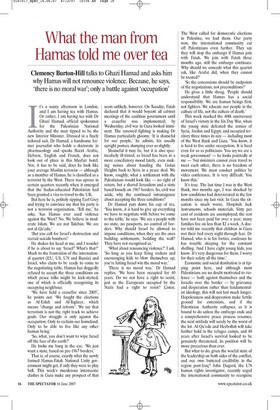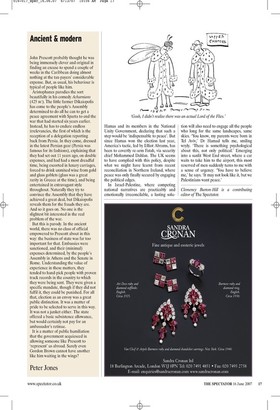What the man from Hamas told me over tea
Clemency Burton-Hill talks to Ghazi Hamad and asks him why Hamas will not renounce violence. Because, he says, 'there is no moral war'; only a battle against 'occupation' 1 t's a sunny afternoon in London, and I am having tea with Hamas. Or rather, I am having tea with Dr Ghazi Hamad, official spokesman for the Palestinian National Authority and the man tipped to be the new Interior Minister. Dressed in a finely tailored suit, Dr Hamad, a handsome former journalist who holds a doctorate in pharmacology and speaks fluent Arabic, Hebrew, English and French, does not look out of place in this Mayfair hotel. Nor, it has to be said, does he look like your average Muslim terrorist — although as a member of Hamas, he is classified as a terrorist by the West. There was uproar in certain quarters recently when it emerged that the Sudan-educated Palestinian had been granted a visa to travel to the UK.
But here he is, politely sipping Earl Grey and trying to convince me that his party is not a terrorist organisation. 'Tell me,' he asks, 'has Hamas ever used violence against the West? No. We believe in moderate Islam. We are not Taleban. We are not al-Qa'eda.'
'But you call for Israel's destruction and recruit suicide bombers!'
He shakes his head at me, and I wonder if he is about to say 'Israel? What's that?' Much to the frustration of the international quartet (EU, US, UN and Russia) and Israel, who claim to be ready to come to the negotiating table, Hamas has doggedly refused to accept the three conditions on which peace talks might be kick-started; one of which is officially recognising its occupying neighbour.
'We have held a ceasefire since 2005', he points out. 'We fought the elections as Al-Eslah and Al-Tagheer, which means "change and reform". We say that terrorism is not the right track to achieve goals. Our struggle is only against the occupation. Only to reclaim our homeland. Only to be able to live like any other human being.'
'So, what, you don't want to wipe Israel off the face of the earth?'
He looks me bang in the eye. 'We just want a state, based on pre-1967 borders.'
That is, of course, exactly what the newly formed Hamas-Fatah National Unity government might get, if only they were to play ball. This week's murderous internecine clashes in Gaza make any prospect of that seem unlikely, however. On Tuesday, Fatah declared that it would boycott all cabinet meetings of the coalition government until a ceasefire was implemented; by Wednesday, civil war in Gaza looked imminent. The renewed fighting is making Dr Hamas particularly gloomy. 'It is shameful for our people,' he admits, his usually upright posture slumping ever so slightly.
Shameful it may be, but it is also spectacularly ill-timed, as Israel has been in a more conciliatory mood lately, even making noises about handing the Golan Heights back to Syria in a peace deal. We know, roughly, what a settlement with the Palestinians would look like — no right of return, but a shared Jerusalem and a state based loosely on 1967 borders. So, civil war aside, why the continued intransigence about accepting the three conditions?
Dr Hamad puts down his cup of tea. 'You know, it is hard to give up everything we have to negotiate with before we come to the table,' he says. 'We are a people with no state, no passports, no control of borders. Why should Israel be allowed to impose conditions, when they are the ones building settlements, building the wall? They have not recognised us.'
'What about renouncing violence?' I ask. 'So long as you keep firing rockets and encouraging kids to blow themselves up, you're letting Israel win the moral war.'
'There is no moral war,' Dr Hamad replies. 'We have been occupied for 40 years. Do we not have a right to resist, just as the Europeans occupied by the Nazis had a right to resist? Listen.
The West called for democratic elections in Palestine, we had them. Our party won, the international community cut off Palestinians even further. They say they will stop the embargo if Hamas join with Fatah. We join with Fatah three months ago, still the embargo continues. Why should we concede what this quartet ask, like Arafat did, when they cannot be trusted?'
'So the concessions should be endpoints of the negotiations, not preconditions?'
He gives a little shrug. 'People should understand that Hamas has a social responsibility. We are human beings first, not fighters. We educate our people in the culture of life, not the culture of death.'
This week marked the 40th anniversary of Israel's victory in the Six Day War, when the young state defeated the armies of Syria, Jordan and Egypt, and occupied territory three times its size — including most of the West Bank and Gaza. 'You know, it is hard to live under occupation. It is hard even for us as politicians. You say we are a weak government' — he looks pointedly at me — 'but ministers cannot even travel to meet each other, there is no freedom of movement. We must conduct politics by video conference. It is very difficult. You know this.'
It's true. The last time I was in the West Bank, two months ago, I was shocked by how conditions had deteriorated in the few months since my last visit. In Gaza the situation is much worse. Hospitals lack instruments; schools materials. Sixty per cent of residents are unemployed; the rest have not been paid for over a year; many families live on less than $2 a week. A doctor told me recently that children in Gaza wet their bed every night through fear. Dr Hamad, who is in his forties, confesses he has trouble sleeping for the constant shelling. 'And I have eight young kids, you know. It's very dangerous for them. I worry for their safety all the time.'
Economic and social destitution is at tipping point here, and although most Palestinians are no doubt motivated to violence — both against themselves and the Israelis over the border — by grievance and desperation rather than fundamentalist ideology, this will not last much longer. Hopelessness and desperation make fertile ground for extremists, and if the Palestinian Authority collapses, as it is bound to do unless the embargo ends and a comprehensive peace process resumes, the next intifada will surely be the worst of the lot. Al-Qa'eda and Hezbollah will take further hold in the refugee camps, and 40 years after Israel's survival looked to be genuinely threatened, its position will be more precarious than ever.
But what to do, given the woeful state of the leadership on both sides of the conflict, and our own battered credibility in the region post-Iraq? John Dugard, the UN human rights investigator, recently urged the international community to recognise Hamas and its members in the National Unity Government, declaring that such a step would be 'indispensable to peace'. But since Hamas won the election last year, America's tactic, led by Elliot Abrams, has been to covertly re-arm Fatah, via security chief Mohammed Dahlan. The UK seems to have complied with this policy, despite what we might have learnt from recent reconciliation in Northern Ireland, where peace was only finally secured by engaging the political edges.
In Israel-Palestine, where competing national narratives are practicably and emotionally irreconcilable, a lasting solution will also need to engage all the people who long for the same landscapes, same skies. 'You know, my parents were born in Tel Aviv,' Dr Hamad tells me, smiling wryly. 'There is something psychological about this, not only political.' Emerging into a sunlit West End street, where a car waits to take him to the airport, this most reserved of men suddenly turns to me with a sense of urgency. 'You have to believe me,' he says. 'It may not look like it, but we Palestinians want peace.'
Clemency Burton-Hill is a contributing editor of The Spectator.





















































 Previous page
Previous page